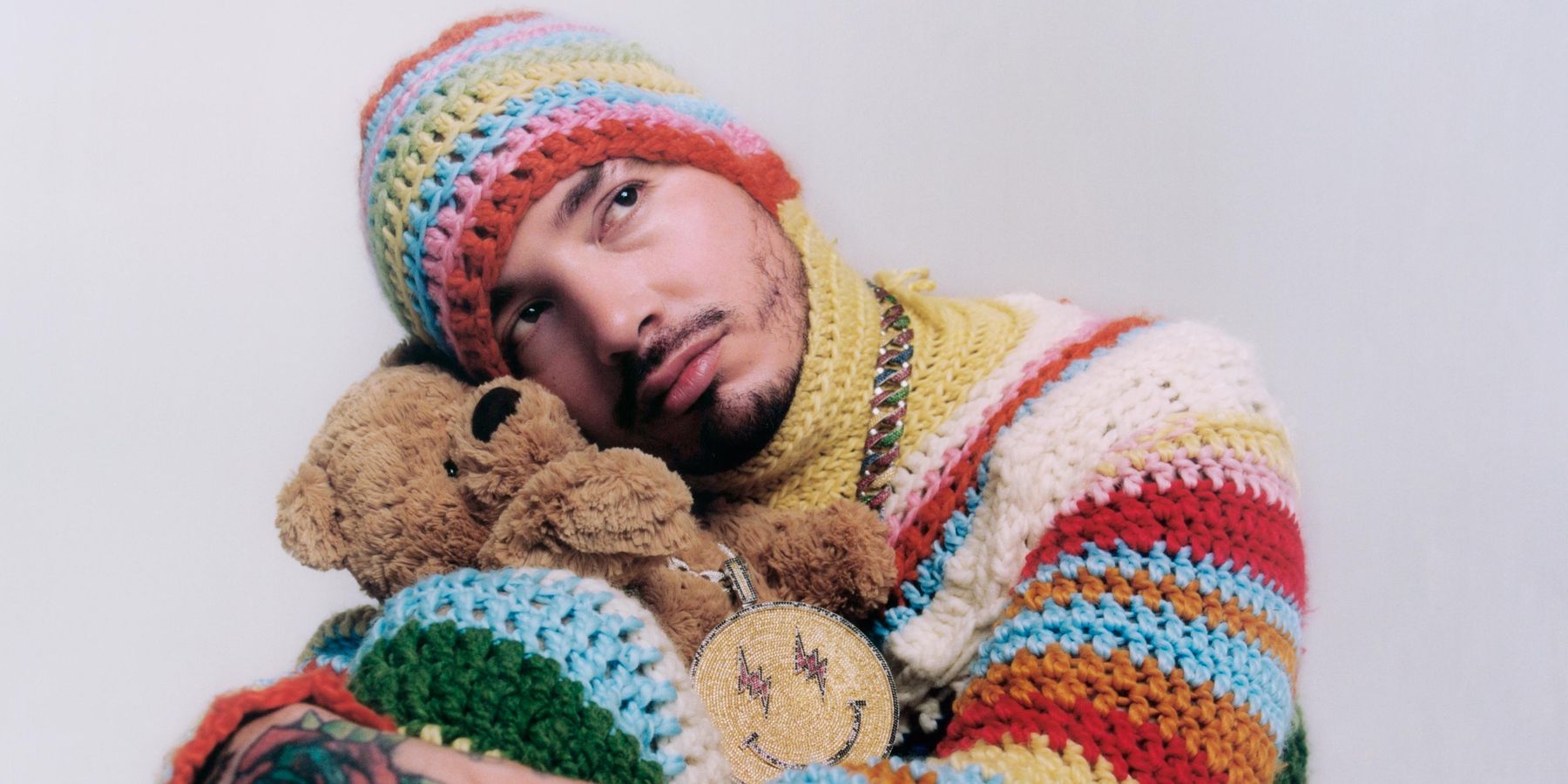
Music
J. Balvin's Quest to 'Elevate the Culture'
Story by Katelina Eccleston / Photography by Mat + Kat / Styling by Sita Abellan / Grooming by Manuela Melguizo
12 October 2021

José Álvaro Osorio Balvín — better known to the world as J. Balvin — is an ambassador of "El Movimiento," or the Latin "Urban" Movement, with musical roots in Panama, New York, Puerto Rico, the Dominican Republic — and now Colombia. In an endearing conversation over-the-phone, Balvin is full of voracity that emphasizes his desire to "elevate the culture," as he puts it. "We're all global citizens. We're human, period. Music is a universal language."
While Balvin says he's dedicated to "putting Reggaeton on the map," and his attempts have no doubt been fruitful with much acclaim, the international star also admits he doesn't always get everything right.
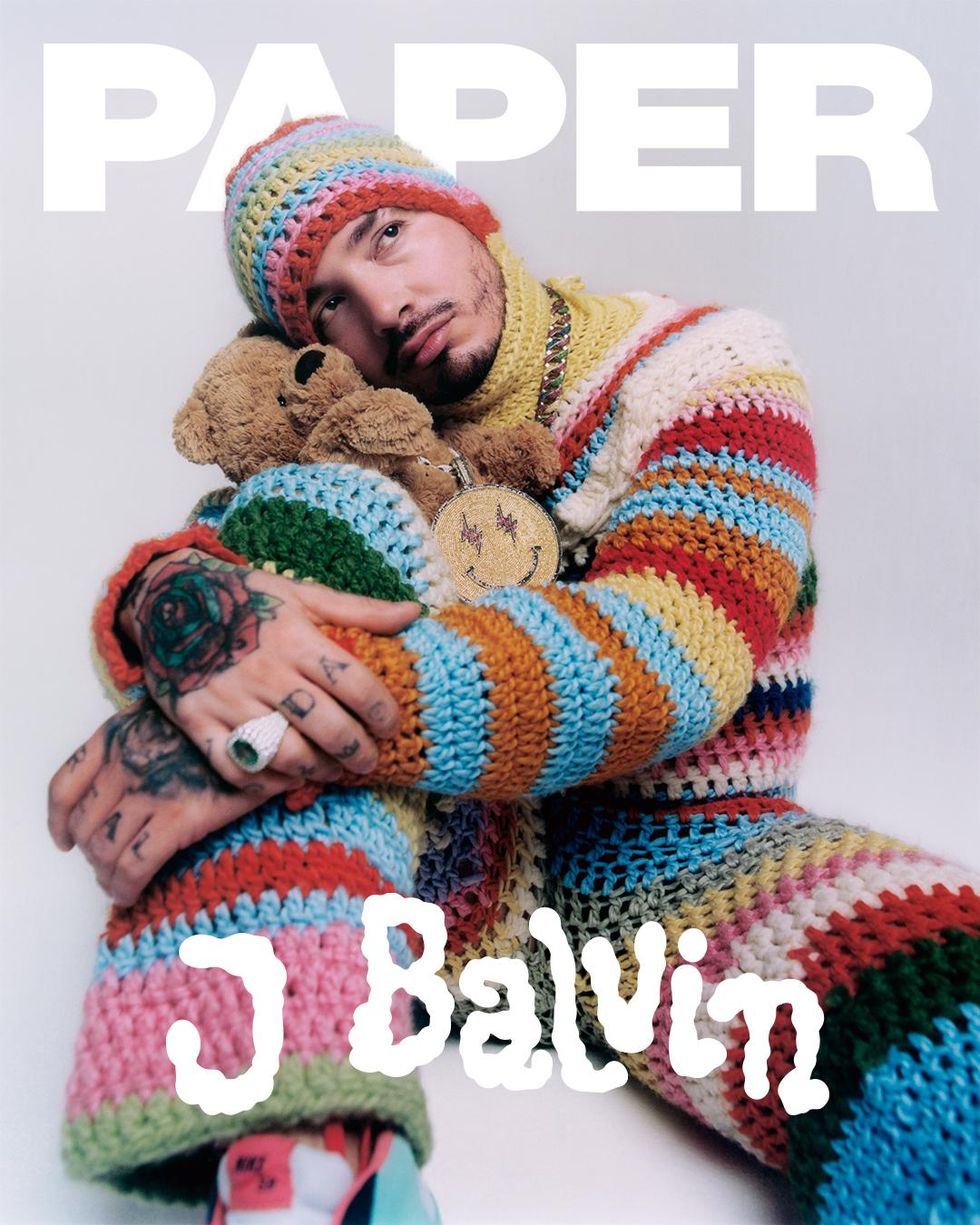
Suit: Gabrielle Schwan, Jewelry and shoes: J. Balvin's own
In 2021, Reggaeton is more mainstream than ever and, over the past decade, Balvin has made himself an integral part of that process. From being the first artist to create a stage for Latin music in Las Vegas with NEON festival, to being the first Reggaeton artist to headline Lollapalooza and even feature a surprise performance with Puerto Rican superstars Wisin Y Yandel, Balvin's legacy has become adapting to increase visibility as he continues to shine on bigger platforms.
Much like hip-hop, Reggaeton has long faced criticism for its brash lyrics, largely African sounds and political impact, so Balvin takes his respect for the genre seriously. He was dedicated to Reggaeton being recognized at this year's Latin Grammys when they snubbed its categorization despite commercial success. Alongside other stars like Daddy Yankee, Tego Calderon or DJ Blass, Balvin campaigned for Reggaeton to be given an official music category without being classified as "urban" or "pop," robbing its respective roots.
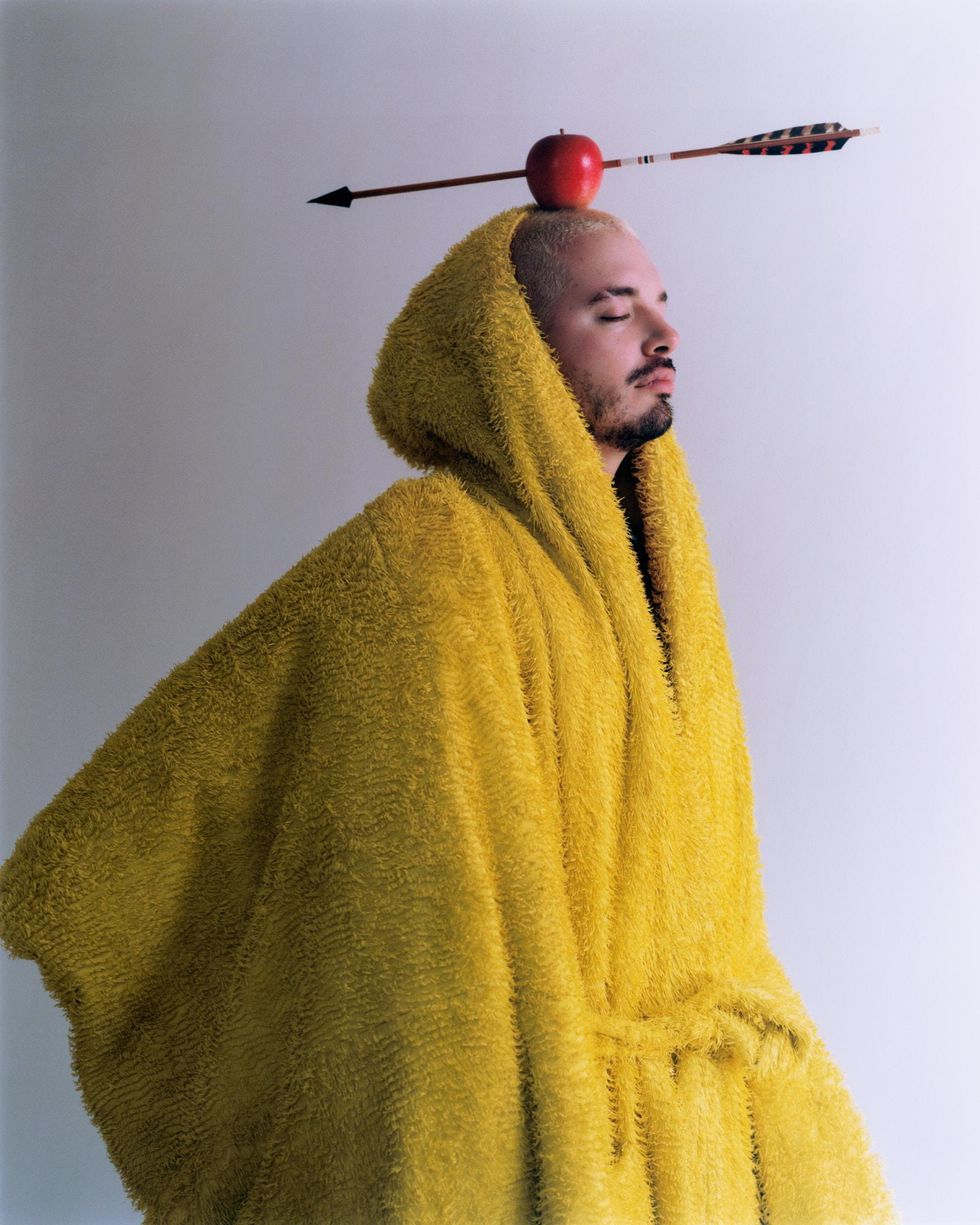
Clothing: Balenciaga
Still, Balvin says he's just "a regular guy with 2,000 mistakes [and] millions of dreams who doesn't want to get caught up in this [music] business, even though he is trying to be a better human every day." Balvin means well, but he intermittently falls short of the latitude necessary for true accountability and cultural equity. So the artist, who consistently attempts to unite Latinos into his #LatinoGang collective, reestablishes himself in his erratically achromatic 24-track album, Jose — and artists like him, introduced to the genre notwithstanding of their ethnic ties, actually need to.
Four Latin Grammys, a Global Icon award, and many accolades later, Balvin still considers himself to be "an artist on the rise." As intrepid as that position may be, Jose is a daring attempt to separate the art from the artist ("it definitely has the DNA of José more than J. Balvin"), and speaks to Balvin's desire for innovation, integration and ultimately enriching "El Movimiento" to become bigger than ever before.

Mask: Gabrielle Schwan, Jewelry: J. Balvin's own
Reggaeton is a complex genre with a complex history born from paralleled collaborations: Afro Antillean Panamanians championing dancehall, Nuyoricans in the Bronx creating hip-hop; Merengue and dance influence from the Dominican Republic, and romantic input from Colombia; Perreo, or the sexual essence of the genre by Puerto Ricans on the island, witty phrases, Bachata. This is why it's considered a "Parallel Movement" — or "El Movimiento" — with multiple genres created in different places that constantly influence each other. Because of constant white-washing, new age and older Reggaeton fanatics alike constantly search for ways to maintain the essence of Perreo in today's sound, which largely eliminates the very Black percussion included in Reggaeton's staple element, "Dembow."
Twenty-five odd years later, as "El Movimiento" behind Reggaeton is more pervasive and whiter than ever, critical interrogation has become pervasive. That being said, Balvin understands the genre's lineage quite well. "Jamaican-Panamanians doing these Spanish versions of dancehall songs was the first step," he says. "Reggae, Raggamuffin, Pancho Pan, El General, even El Chombo with 'Cuentos De La Cripta.' So we know where Reggaeton comes from and if you're in this game you should know where you come from."
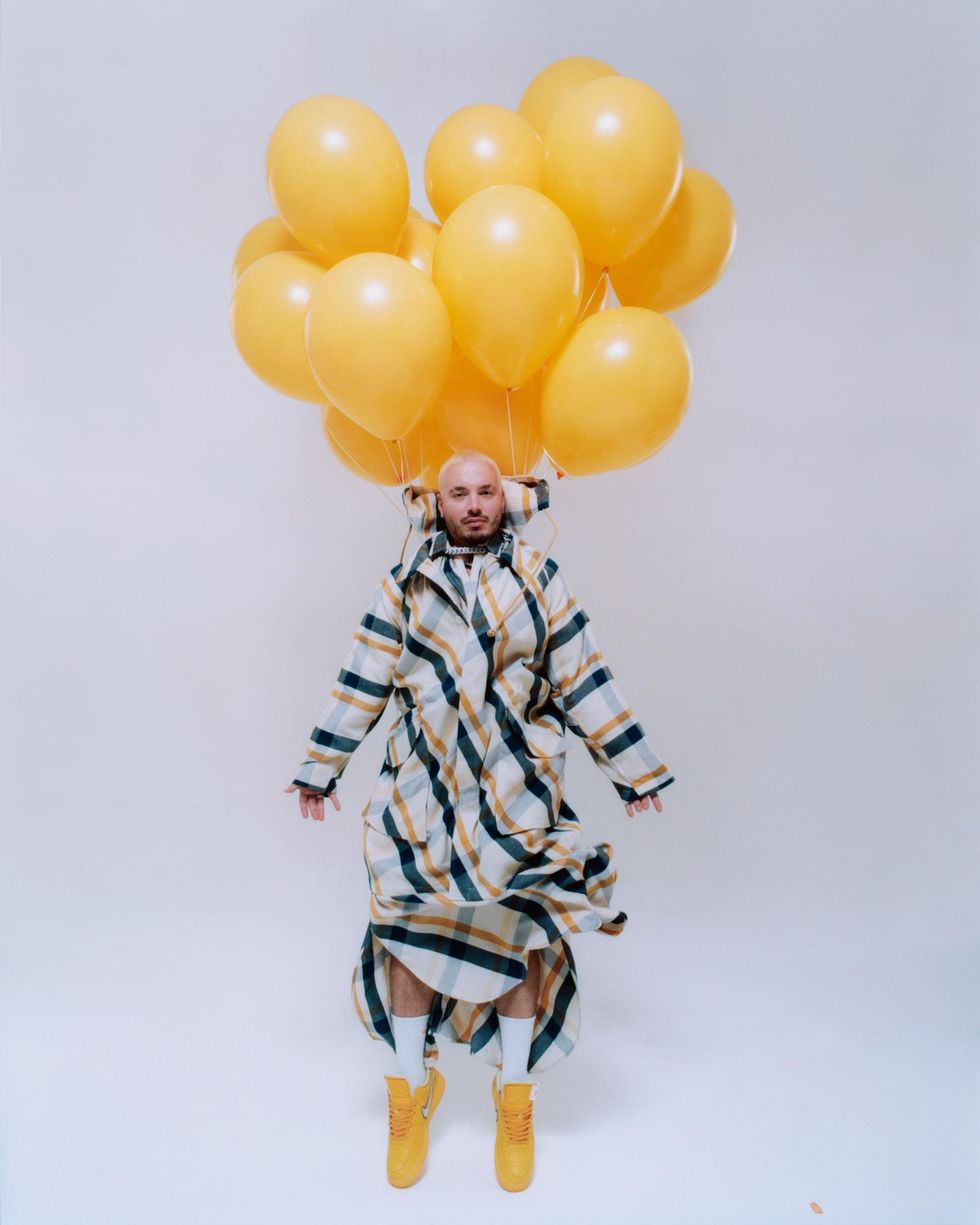
Clothing: Marrakshi Life, Jewelry and shoes: J. Balvin's own
Jose features two delightful homages to Tego Calderon and Yandel's Perreo classic, "Al Natural Remix," first with "Una Nota," featuring Sech, followed by "Acuerdas de Mi," featuring Yandel himself. "It's a nostalgic gift," Balvin says. "Like, oh shit! That's Yandel, the original!" Balvin is dedicated to "giving people their flowers while they're alive" because "this is the way I pay respect to the pioneers of the time," he adds, recognizing who laid out the blueprint for what Reggaeton artists create today.
"Big ups to Panama, big ups to Puerto Rico and now we're here," Balvin says. "It's Colombians up next." His nationalistic pride comes as a result of his desire to help rebrand Colombia as a musical mecca — with "El Movimiento's" colorful refresh — and leave behind remnants of a drug-mired era when Pablo Escobar's violence raptured the country.
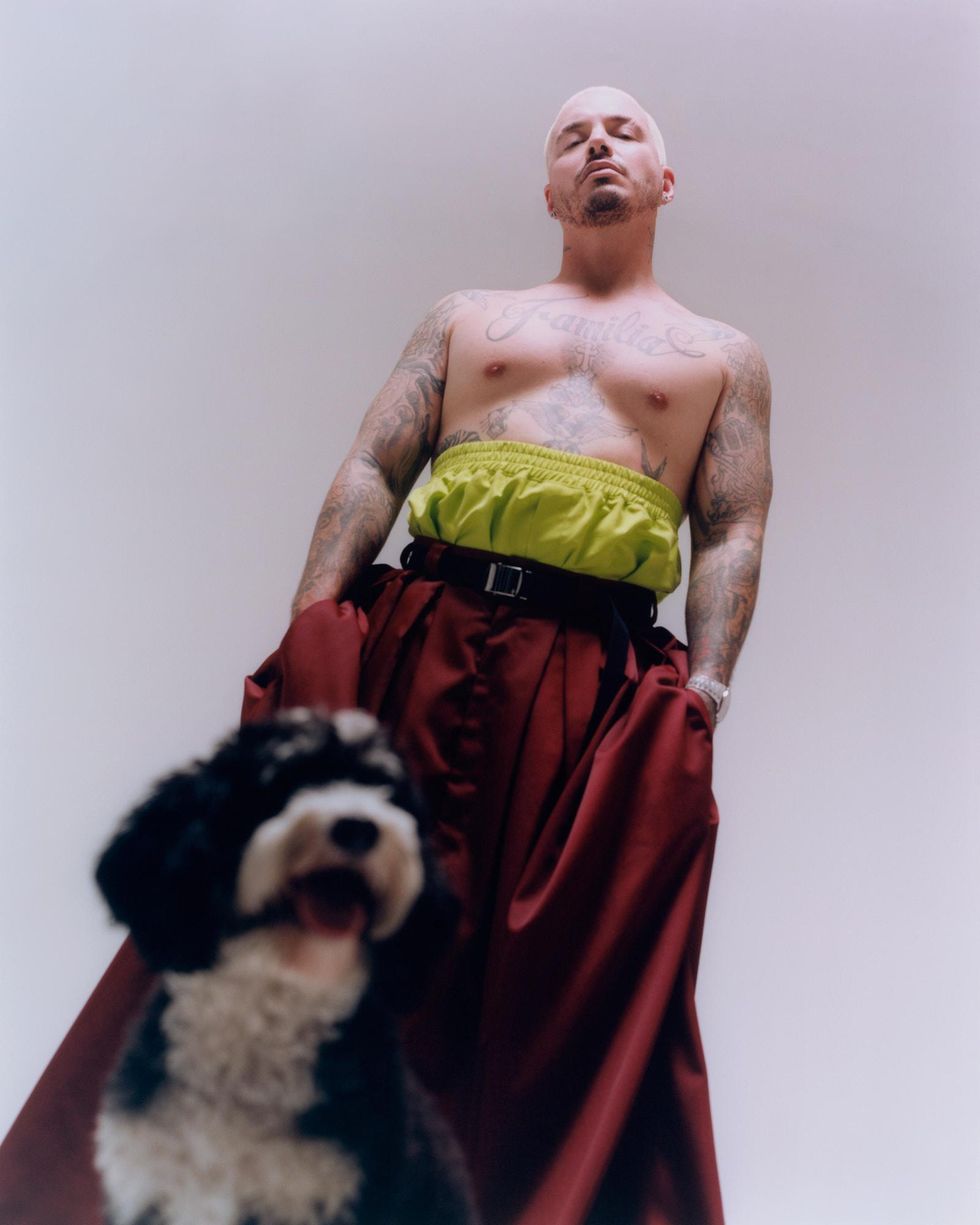
Pants: Willy Chavarria New York, Jewelry: J. Balvin's own
This all introduced a condensed instrumentation of Reggaeton that fuses more mainstream pop sounds into its makeup, often referred to by Colombians as "Reggaeton Seco." There is a reckoning of this concept by monomaniacs of the old school interpolation that has even inspired a movement to reclaim its origins, called "Reggaeton De La Mata." Balvin says "he respects their desire to cling to the roots," while still embarking on his individual creative path.
The oversimplified Reggaeton sound is present in the majority of Balvin's discography resumes on Jose, leaving many hardcore Reggaeton enthusiasts unimpressed. This parallels the racial retribution many are calling for in Latin Music. While Balvin recognizes that his efforts in "El Movimiento" warrant applause, he, like many others, is a sentinel in this space, and someone who's still openly finding his ground in providing opportunities for underrepresented artists — particularly Black Latinos who've long been erased from the genre they created.
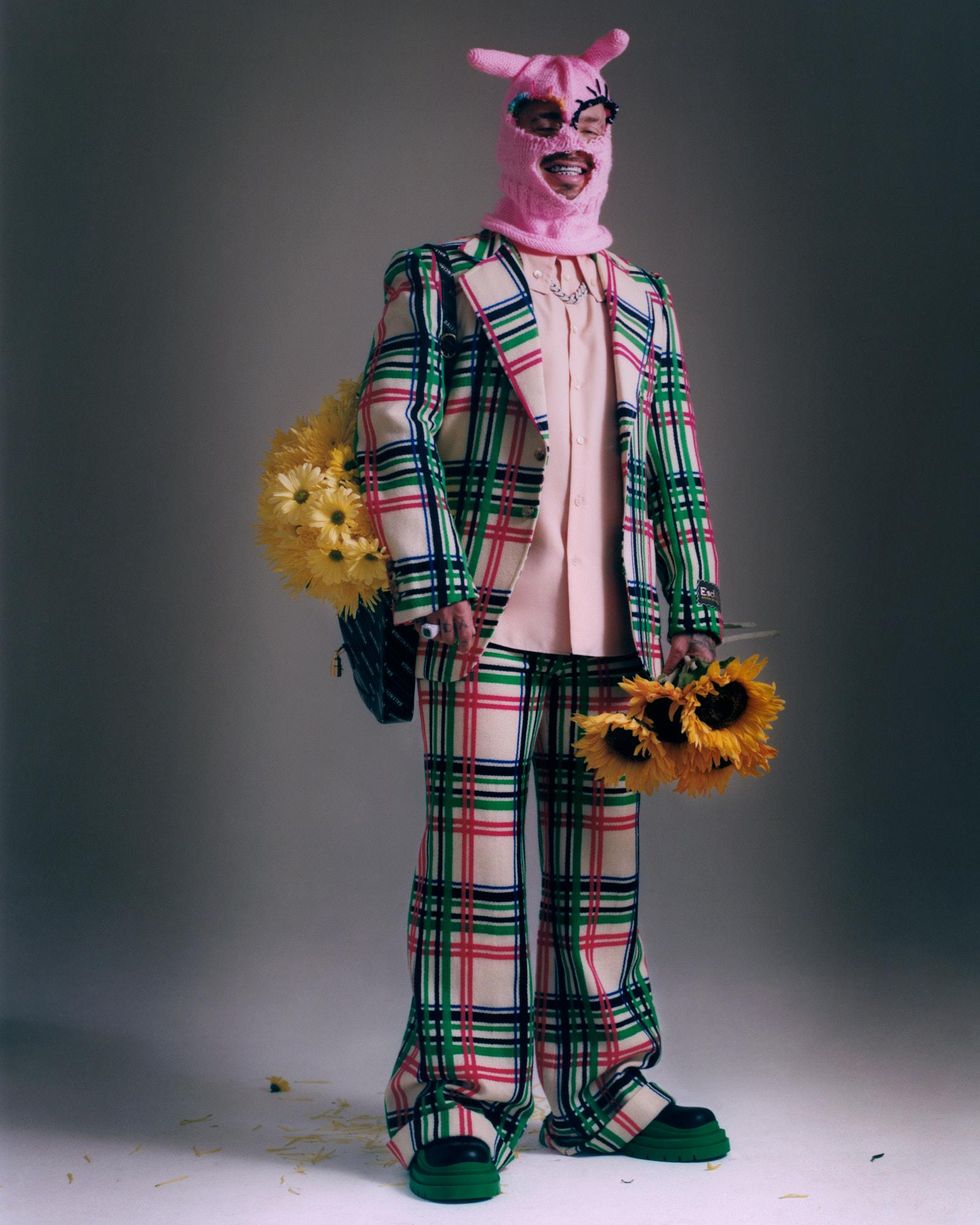
Suit, shirt and bag: Gucci, Mask: Gabrielle Schwan, Shoes: Bottega Veneta
"Every time I find something or someone making statements in different parts of the world, if I can amplify that or get it more into the mainstream, why not?" Balvin says, explaining how he arrived at the artists featured on Jose. "Of course, Reggaeton enthusiasts will be highly critical because they're searching for that hard type of Reggaeton, but I have to evolve as an artist and bring the music to a larger audience." Because "music is for everybody," as Balvin explains.
On Jose, the artist combined that doctrine with careful consideration of the collaborators he onboarded, exemplifying how Balvin has an eloquent talent for curation. "Once you're doing the right thing, we'll find you," he says, speaking about the industry's deliberate exclusion of Negras or Black women in this genre — a gesture that Balvin explains he will emphasize at an even larger scale now that he is taking the steps to educate himself better.
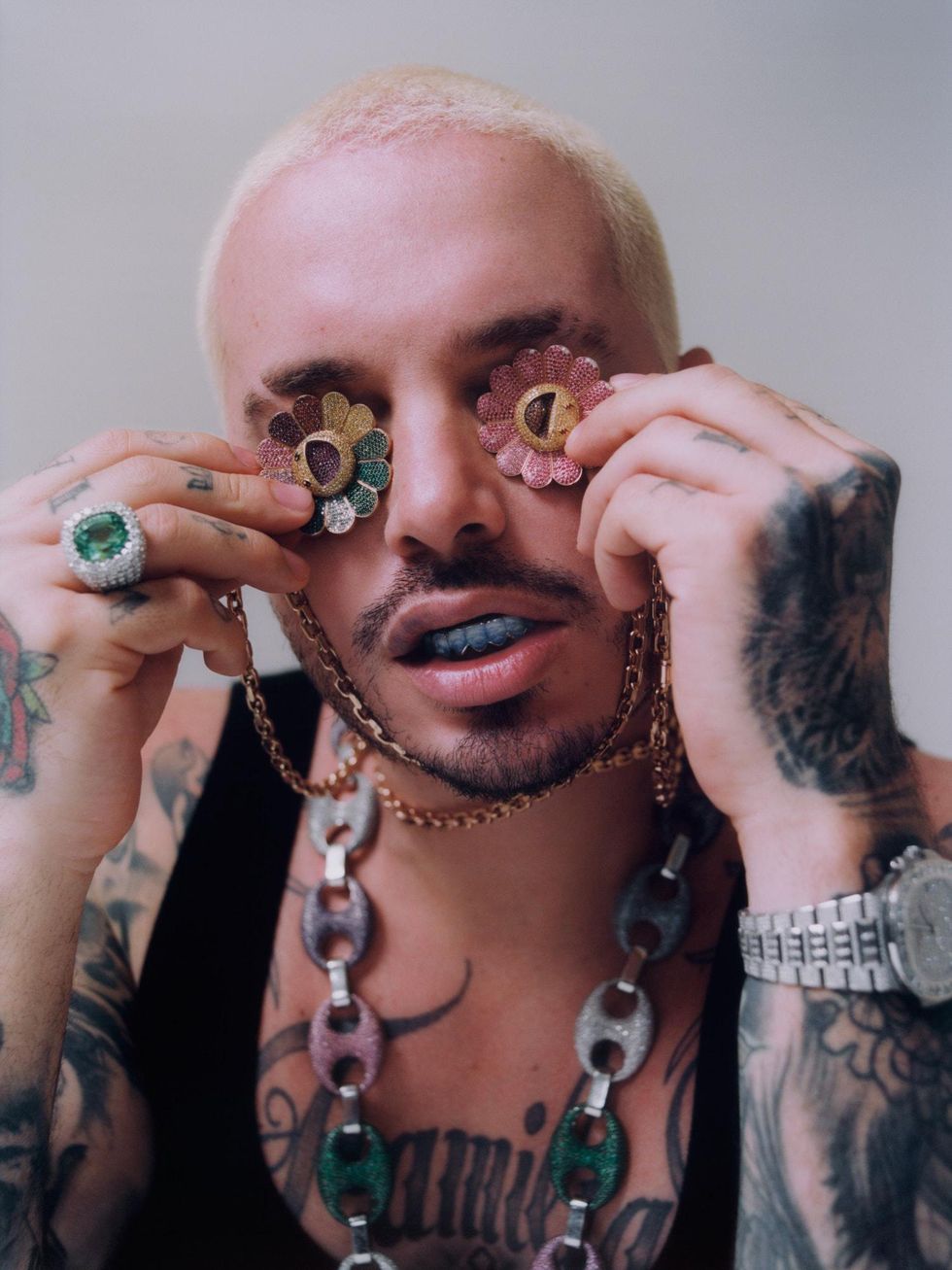
Shirt: Balenciaga, Jewelry: J. Balvin's own
Balvin lives the dream of every "Reggaeton freak," as he puts it, and would like to continue evolving to avoid the possibility of Reggaeton ever becoming "boring" — and to explore spaces Reggaeton has never been before either "because we were not invited or because it just was not thought of to include us at these tables."
Balvin's raunchy number, "Perra," features the Dominican Republic's most controversial act of the moment Tokischa, an up-and-coming female sensation at the center of most scandals, often judged for her queer, "pornographic," and avant-garde lyrical and fashion sense. From continuing the tradition of tender jams over "Reggaeton seco" in "Suerte," to one of the decade's raunchiest songs and most profound racial misconceptions representative of Latino culture in "Perra," Jose illustrates the varied and complex facets of Latinidad.
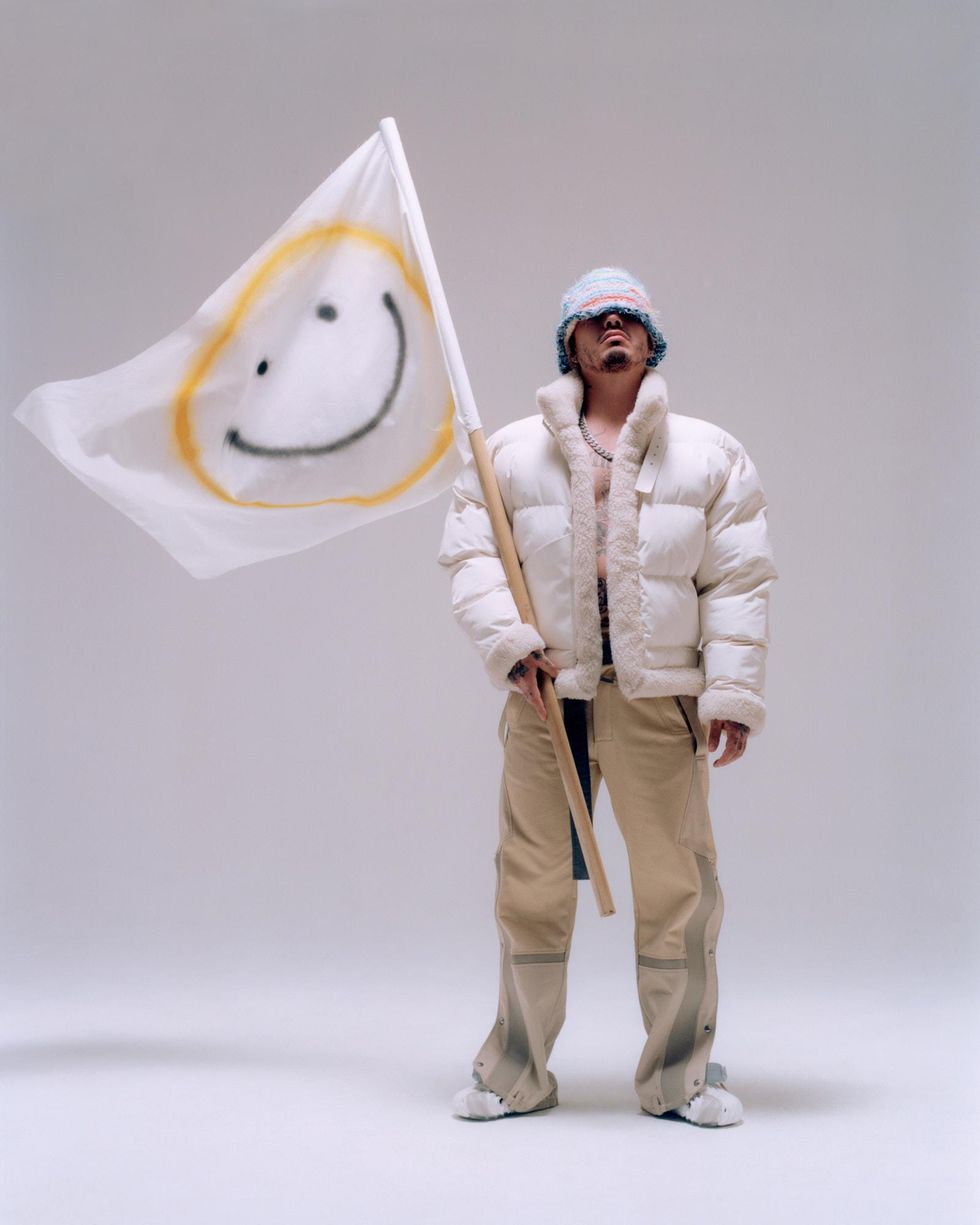
Jacket and pants: Zilver, Hat: Gabrielle Schwan, Jewelry and shoes: J. Balvin's own
Traditionally Latino culture prioritizes the group over the individual. A win for one is a win for the whole community, but Latinos are the fastest growing population in the United States; they are extremely diverse, spanning political and racial backgrounds across the board. And while this practice in heritage often inspires celebration, it also minimizes the hierarchical differences of Latinos at the intersections of subgroups with varying experiences due to race, class and gender.
"Perra" sonically accomplishes everything a Reggaeton enthusiast wants, from naughty lyrics to deep bass and 2000s Perreo nostalgia. However, its music video features a rather disappointing scene where Balvin walks two Black female models on leashes. The clip's purpose was to exemplify the lyrics' "collar and leash" kink, but it eerily mirrors the power dynamics of dark-skinned Black Latina women or Negras in this space. There barely are any Negras in Latin music, in contrast to white Latino men who're dominating in every facet.

Clothing: Louis Vuitton Men's, Hat: Gabrielle Schwan, Jewelry: J. Balvin's own
Jose's mission, apart from Balvin's reintroduction, is to open his fanbase and appease a larger audience of music lovers. "I didn't have Latinos in mind,'' he says, explaining his process for creating the controversial tune, "In Da Getto," which is charting in Italy, Germany and other European countries. Instead, "The purpose of this song was to showcase the Projects as a main element of 'El Movimiento.'" Despite being a "celebratory" song dedicated to the roots of Reggaeton, fans were quick to note the industry-wide ostracism that often encourages artists like Balvin to engage with this subject matter in the first place.
Although Balvin wants to lift Reggaeton's underprivileged lineage into the mainstream, "In Da Getto" begs for the examination of a genre that often assigns racially foreign narratives to artists of privileged backgrounds. This track highlights the issue of Black Latinos being spoken for without consideration of their plight. And if ambassadors of their reality are necessary, wouldn't a more accurate representation come from artists who have had these lived experiences be best — as is so often the case in rap and hip-hop?
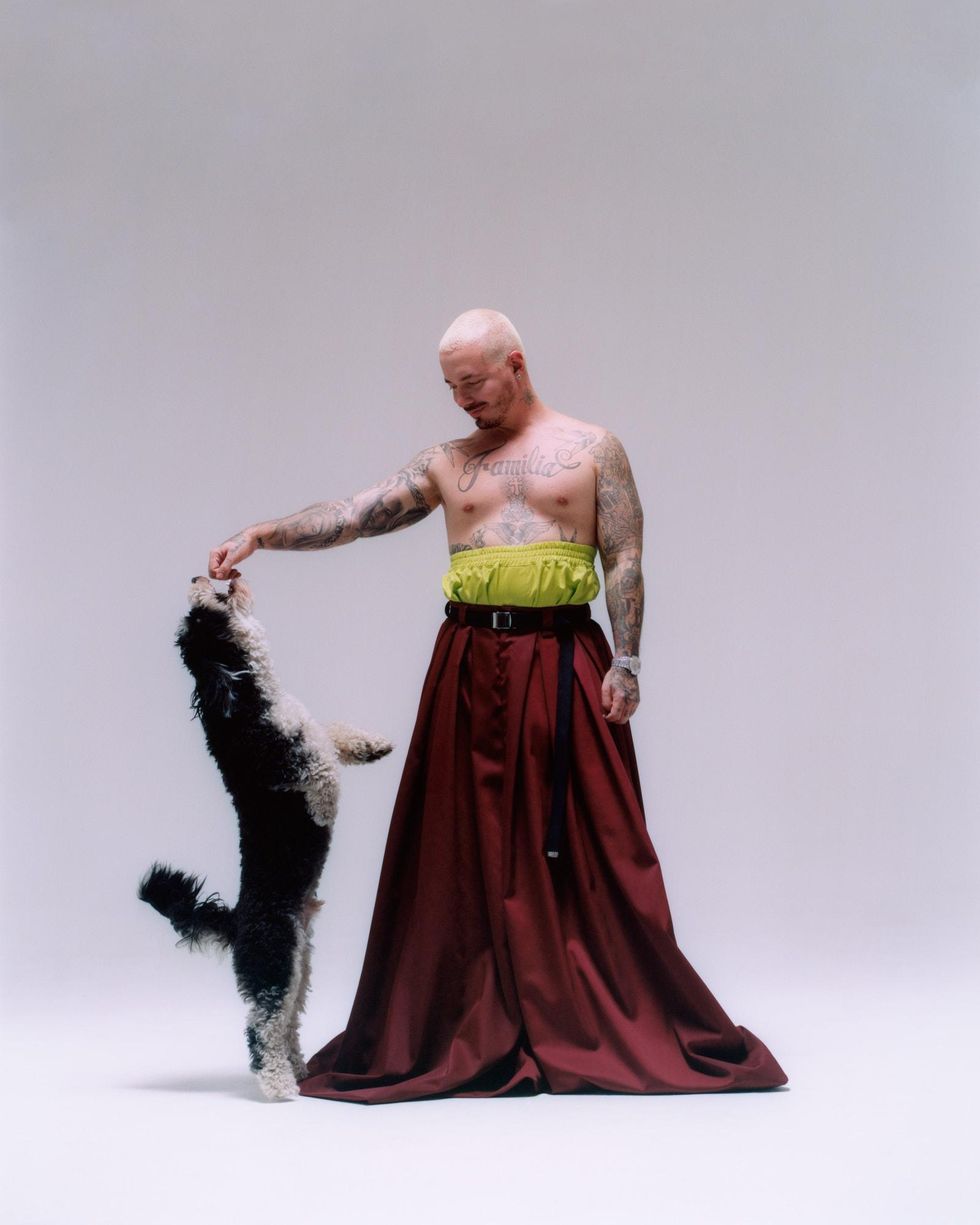
Pants: Willy Chavarria New York, Jewelry: J. Balvin's own
Considering the motive behind an artist's ambition is crucial when they commit to a position of power that helps push a culture forward. Those objectives should also be met with efforts that assist those who're underprivileged in a space celebrating their aesthetics, while excluding or tokenizing them. But this social responsibility doesn't fall on one person — especially not Balvin alone — and instead should be part of a larger systemic effort.
Despite tough questions, Balvin recognizes how he's occasionally missed the mark, with Jose still clearly demonstrating an artist who respects the roots of Reggaeton. "Empathy heals," he says, making for a man who has given examples of striving to do better. "We want to feel welcomed because we might find growth." Balvin's efforts have promoted the culture on levels unforeseen and that deserves applause. While he continues on that quest, the hope is that Balvin actively creates more space — especially for those otherwise unseen — "para la cultura."
Katelina "Gata" Eccleston is an internationally renowned music historian, creative and entrepreneur, whose work is focused on the analysis and social paradigms of Reggaeton. You can follow her on Twitter and Instagram.
Photography: Mat+Kat
Styling: Sita Abellan
Grooming: Manuela Melguizo
Nails: Sunny Han
Prop styling: Nat Hoffman
Type treatment: Callum Abbott
Assistant stylist: Afan O'Donovan
Photo assistants: Kenyon Anderson, Ariana Rodriguez
Styling assistants: Steven Gillman II, Amy Amato
Prop assistant: Ade Kassim